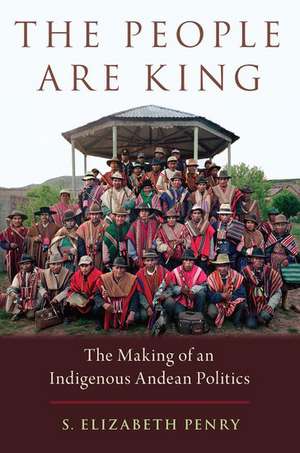The People Are King: The Making of an Indigenous Andean Politics
Autor S. Elizabeth Penryen Limba Engleză Paperback – 6 dec 2019
| Toate formatele și edițiile | Preț | Express |
|---|---|---|
| Paperback (1) | 346.89 lei 3-5 săpt. | |
| Oxford University Press – 6 dec 2019 | 346.89 lei 3-5 săpt. | |
| Hardback (1) | 587.66 lei 31-37 zile | |
| Oxford University Press – 14 ian 2020 | 587.66 lei 31-37 zile |
Preț: 346.89 lei
Nou
Puncte Express: 520
Preț estimativ în valută:
66.39€ • 69.05$ • 54.81£
66.39€ • 69.05$ • 54.81£
Carte disponibilă
Livrare economică 24 martie-07 aprilie
Preluare comenzi: 021 569.72.76
Specificații
ISBN-13: 9780195161618
ISBN-10: 0195161610
Pagini: 320
Ilustrații: 15 halftones
Dimensiuni: 231 x 155 x 20 mm
Greutate: 0.45 kg
Editura: Oxford University Press
Colecția OUP USA
Locul publicării:New York, United States
ISBN-10: 0195161610
Pagini: 320
Ilustrații: 15 halftones
Dimensiuni: 231 x 155 x 20 mm
Greutate: 0.45 kg
Editura: Oxford University Press
Colecția OUP USA
Locul publicării:New York, United States
Recenzii
This book by Elizabeth Penry gives a history of ordinary Andeans of the Audiencia de Charcas who, throughout the centuries of Spanish domination, defined themselves by reinterpreting colonial institutions and ideas. It shows how those people struggled to govern themselves and to acquire full rights. It also demonstrates how they moved from 'a politics of hereditary nobility, the caciques, to a hybrid form of participatory democracy, with the town council at its heart, that had roots in both the Andean and Spanish worlds.' This history is based on an impressive analysis of historical sources coming from many archives, and written with microhistory tools: interwoven stories that make a complex transformation comprehensible.... This is a wonderfully written book, which explores a significant part of the rich Andean historiography and presents well-analysed cases.
This is an innovative and important study for the Andes, past and present.
Elizabeth Penry offers a sharply original account of the Andean Age of Rebellions, placing it in a culture of civic populism whose roots extended to both pre-conquest Peru and medieval Spain. Where previous narratives have gravitated toward charismatic leaders, The People Are King breathes a democratic spirit that is both moving and persuasive.
This meticulously researched and gracefully narrated look at the transformation over time of the public sphere in indigenous communities of highland Bolivia offers readers a remarkable window into how and why the Great Rebellion of the 1780s unfolded by focusing on communities instead of on the leadership. Instead of concentrating on the Native lords that historians commonly document, Penry focuses on how local indigenous councils wrested authority from hereditary rulers, and how they organized using popular festivals and the mails. She shows how Native Andeans created forms of popular sovereignty that evolved over two centuries by combining Spanish forms of institutionalized authority with their own political structures and values into what she calls 'an elaborate synthesis that [led] to revolutionary conclusions.' This is an unusual and exciting second look at the prelude to independence in Spanish America.
Elizabeth Penry's skillfully crafted study reconstructs the ways colonial Andean comunes or commons became grassroots laboratories where modern ideas of communal self-government and popular sovereignty gradually emerged. Her vivid analysis of village life in the highlands of colonial Charcas over three centuries reveals how commoner-led republics reconciled the ethos of solidarity and mutual obligation of Pre-Columbian kinship groups with Castilian concepts of town government, corporatism, and civic Catholicism, in a synthesis that drew from both traditions but was, in fact, reducible to neither of them. Inscribed in the best traditions of Andean history and ethnohistory, The People Are King is a much-needed contribution to the intricate ways indigenous community politics helped establish the foundations of the modern world.
This is an innovative and important study for the Andes, past and present.
Elizabeth Penry offers a sharply original account of the Andean Age of Rebellions, placing it in a culture of civic populism whose roots extended to both pre-conquest Peru and medieval Spain. Where previous narratives have gravitated toward charismatic leaders, The People Are King breathes a democratic spirit that is both moving and persuasive.
This meticulously researched and gracefully narrated look at the transformation over time of the public sphere in indigenous communities of highland Bolivia offers readers a remarkable window into how and why the Great Rebellion of the 1780s unfolded by focusing on communities instead of on the leadership. Instead of concentrating on the Native lords that historians commonly document, Penry focuses on how local indigenous councils wrested authority from hereditary rulers, and how they organized using popular festivals and the mails. She shows how Native Andeans created forms of popular sovereignty that evolved over two centuries by combining Spanish forms of institutionalized authority with their own political structures and values into what she calls 'an elaborate synthesis that [led] to revolutionary conclusions.' This is an unusual and exciting second look at the prelude to independence in Spanish America.
Elizabeth Penry's skillfully crafted study reconstructs the ways colonial Andean comunes or commons became grassroots laboratories where modern ideas of communal self-government and popular sovereignty gradually emerged. Her vivid analysis of village life in the highlands of colonial Charcas over three centuries reveals how commoner-led republics reconciled the ethos of solidarity and mutual obligation of Pre-Columbian kinship groups with Castilian concepts of town government, corporatism, and civic Catholicism, in a synthesis that drew from both traditions but was, in fact, reducible to neither of them. Inscribed in the best traditions of Andean history and ethnohistory, The People Are King is a much-needed contribution to the intricate ways indigenous community politics helped establish the foundations of the modern world.
Notă biografică
S. Elizabeth Penry is Assistant Professor of History and Latin American Studies at Fordham University.
